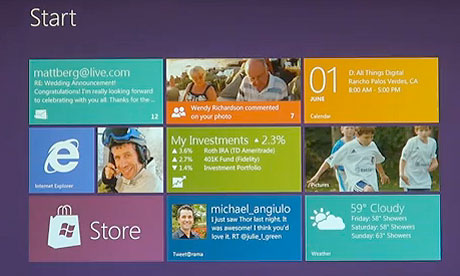In a nutshell, Microsoft is turning the Windows desktop
into a web browser and is going the way of Palm Web OS. HTML5 +
Javascript/unmanaged C++ for Windows Apps and they are pretty
much signaling the end of the CLR (Common Language Runtime) -- (the .NET
framework and all that it entails seems to not fit anywhere in the Microsoft
roadmap anymore and unmanaged C is coming back...). The move also points to the
time of the big mainframes (now called the cloud) and pretty much Microsoft is
noting that the Cloud becomes the computer and the OS you run on your device
has pretty much no relevance... (The new Metro look)
When users boot up their new laptops or desktops using Windows 8 will always see the Metro look, and if they want to use the good ol' Windows Desktop, they would have to find the tile to launch it.

Of course there is a Registry Hack that would allow you to change this behavior so that you can end up in the good ol' desktop all the time... but no comment on Microsoft shutting that down yet... hopefully not.
I really don't want to talk about the Metro look, and its App Store, but is being advertised heavily by Microsoft, Basically the ugly 3 year old design of the squares will be running on the Microsoft WinRT which basically replaces Win32\Internet Explorer\.NET CLR. Metro and Windows 8 Desktop will both coexist on your laptop/computer like enemies. You cannot access a File that resides on your Desktop from Metro and viceversa. You could in theory write a web service and host it on your Desktop machine and have your Metro application consume it to access data from your desktop, but that goes against the MS licensing agreement...

Metro applications can only be distributed thru the App Store, and MS would have to approve your application prior to releasing it to the App Store (they are imitating Apple, just not in a very smart way)
Metro applications will be developed in C/unmanaged C++or Javascript, but Javascript would pretty much be able to access / interact with WinRT the way C does... weird huh?
Even though Metro looks and feels like Windows mobile, it doesn't support Silverlight marking the end of that technology.
WinRT basically represents the taking back of the .NET Framework into the core Windows team and offers first-class support for C and C++ (as you would expect) and Javascript...
HTML 5 is pretty much taking over Silverlight... why? most likely because they are trying to attract today's application developers. Most of client-side developers are building HTML apps, another big number are writing iOS and Android apps. Learning XAML/Silverlight technologies is very difficult and Microsoft has done a poor job at teaching\promoting WPF. Since they are losing the battle against iOS/Android, going HTML5 might be their only option to regain some of the market, but I think they are going about it the wrong way...
The blogs are flodded with more questions and doubts than excitement... here is a link to Channel 9 where you can read more about it...
We can just wait and see what happens, but this may very well be what Apple needed to expand even more into the enterprise. the cards seem to have been spread. Will Windows market share decrease even more? I doubt they can afford another Vista like deployment (seriously, a lot of folks still use WinXP) Will Apple up their game? We can only wait and see.
No comments:
Post a Comment